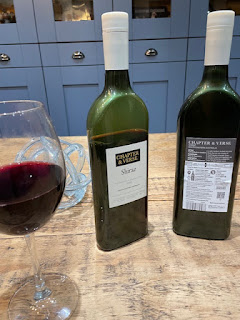Yesterday, we moved the clocks an
hour forward. It’s British Summer Time. When I worked shifts, it was a prized night
shift to try and get. These days, it simply means a slightly earlier start to the
day. What is different is that most of our clocks adjust themselves
automatically. The cooker and one wall clock are the only ones that don’t. I
can just about understand how my phone and laptop change the time, but my car
doing the same thing is slightly baffling.
I’ve been thinking about the nature of change a lot this past week. Lots of possible reasons, I guess. For example, every couple of days I do the ‘cabbage run’. In the winter time, J likes to give her goats a cabbage each day. They get fresh hay and a goat mix, but rightly so, she likes them to have fresh greens. In the summer, I go hedge trimming and bring home sacks of lovely greenery for them. Anyway, the ‘cabbage run’ is a 1 km walk to Aldi (there are other supermarkets available), and a 1 km walk back.
Last week while collecting the cabbages, I walked up and down the central aisle (where there is always something to buy that you didn’t know you needed) when my eye was drawn to what looked like flat bottles of wine. They were indeed flat bottles, holding the same amount of wine as ordinary bottles, but where the weight was 84% less than glass bottles. I was intrigued, and bought a few!Coming home I poured myself a
glass, and found the wine was quite drinkable. What an innovation, a change for
the better, just like when screw caps replaced corks. That was a change that
some folk thought was a change too far. I didn’t, and just like the screw caps,
I welcome this latest change. In the summer time, we often pack a rucksack with
a picnic and bottles of wine and go and listen to the live music in our local park.
These new plastic wine bottles, as well as being much lighter, won’t run the risk
of being smashed along the way either.
Some changes are cyclical in
nature. We live just north of Blackpool. Like many other coastal and seaside
towns, Blackpool has had to reinvent itself. The days when folk from across
Lancashire and Greater Manchester came for a week or two in a guest house have
long gone. Back in 1894 when the famous Blackpool Tower was first opened to the
public, the resort would often get as many as 50,000 visitors each year. By 1937,
more than 10 million visitors came to Blackpool! During the 1960/70s visitor numbers
went into decline, as cheap Mediterranean holidays gained in popularity.
However, post-pandemic there has been a resurgence in its popularity, with record
numbers of visitors to the town, there were over 20 million visitors in the
year 2022-23.
Whilst for many people, Blackpool
might be a great place to visit and enjoy a holiday, living here isn’t always
so great for many people. Blackpool contains eight of England’s 10 most deprived
wards. It has a lower life-expectancy than that of people living in Angola.
Life expectancy is one of the key indicators of health across a population. It
is usually measured as being the average number of years that a newborn is
expected to live when applied across current mortality rates. In Blackpool, the
life expectancy for women is 79.00 and for men, 73.4 years. Both these figures
are way below the national average, and the gap continues to grow.
Not only do folk in Blackpool
live shortened lives, they also spend a smaller proportion of their lifespan in
good health and without disability. As with other parts of the UK, health inequalities
are a large factor in making this a difficult situation to resolve. There are
high levels of smoking, obesity, alcohol and drug misuse, all overlaid with other
social determinants of poor health, including poor housing and limited
employment opportunities. Blackpool also appears to be a fairly dangerous place
to live. Last year, it was the second worst town in Lancashire for criminal activity.
The most common crimes during 2023 were violence and sexual offences. Blackpool’s
least common crime is bicycle theft. Changing this picture will involve decisions
and choices that individuals make, but some will need Government support and
funding. Don’t hold your breath though.
Some things don’t change. Last
week, I was able to visit some of our Health and Justice Service colleagues
working in prisons around the North West of England. I visited two very
different male prisons and came away mightily impressed with what I observed.
Great care, compassionate approaches being provided in a person-centred way, but
in a context that was uncompromising about security and safety. What did I see that
made me think some things never change? Many of the men knew little about their
own health journeys and when assessed would more often than not say ‘I will
need to ask my mum; she will know’. This was even true of a prison officer
suspected of being in contact with someone diagnosed with measles. When asked
if he had received the MMR vaccination, he responded by saying he didn’t know,
and ‘would need to ask his mum’. And yes, I bet my mum would know how to
reset that clock on the cooker too!

.jpg)
Interesting read. My question is what material is used in making these flat wine bottles. Great they are lighter however, can these material aid in lesser weight and accidents but may contribute to the environment in an unkind way. Just asking, as I have not see this new product. The points made about Blackpool is very informative, as a newby who just recently moved to the area, it gave me an eyesight as to what I have let me self into..
ReplyDelete